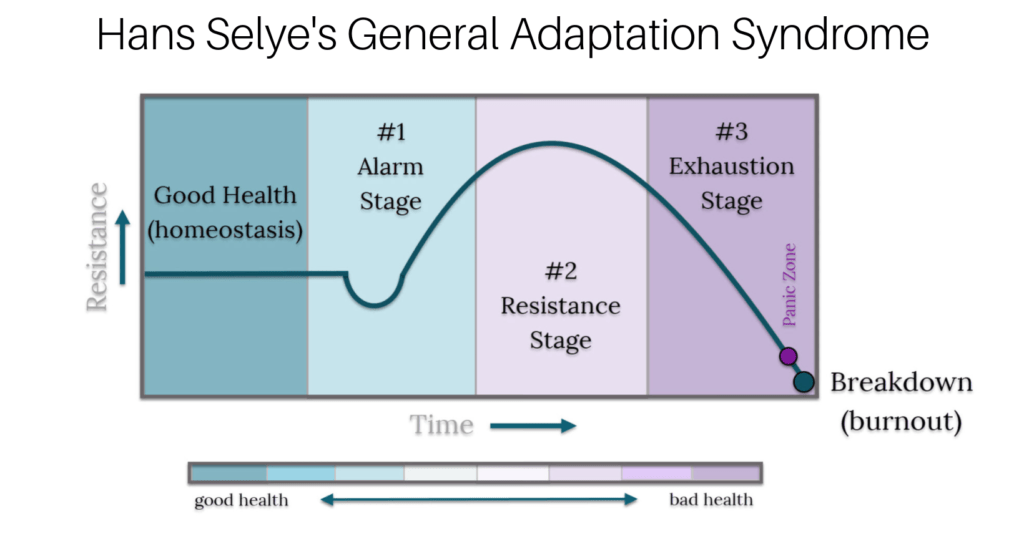From Stress to Burnout: Your Comprehensive Guide to Recognition, Understanding, and Overcoming

In today’s fast-paced world, burnout has become a prevalent issue affecting people from all walks of life. Whether you’re a student juggling assignments, a professional managing deadlines, or a parent balancing work and family responsibilities, the relentless demands of modern life can take a toll on your mental and physical well-being.
Burnout isn’t just feeling tired or stressed; it’s a state of emotional, physical, and mental exhaustion caused by prolonged stress and overload. However, recognising the signs of burnout, understanding the difference between stress and burnout, and grasping concepts like the General Adaptation Syndrome (GAS) are essential for effectively addressing and overcoming this issue.
The Difference Between Stress and Burnout
While stress and burnout are often used interchangeably, they are distinct experiences with different underlying causes and manifestations.
- Stress is a normal response to challenging or demanding situations, often characterised by feelings of pressure, tension, and heightened arousal. It can be temporary and typically resolves once the stressor is removed or managed effectively.
- Burnout, on the other hand, is a state of chronic, excessive stress that leads to emotional, physical, and mental exhaustion. It is often the result of prolonged exposure to high levels of stress, coupled with a lack of adequate coping mechanisms and support systems.
By understanding the subtle nuances between these experiences, we empower ourselves to recognise when we’re veering towards burnout and take decisive action to steer ourselves back on course.
General Adaptation Syndrome (GAS) and Stress
The General Adaptation Syndrome, proposed by Hans Selye, describes the body’s response to stressors in three stages: alarm, resistance, and exhaustion.

- Alarm Stage: When faced with a stressor, the body enters the alarm stage, characterised by the activation of the “fight or flight” response. Physiological changes occur, such as increased heart rate, elevated blood pressure, and the release of stress hormones like cortisol and adrenaline.
- Resistance Stage: If the stressor persists, the body enters the resistance stage, where it attempts to adapt and cope with the ongoing stress. During this phase, the body mobilises resources to maintain physiological stability and cope with the demands placed upon it.
- Exhaustion Stage: Prolonged exposure to stress can eventually lead to the exhaustion stage, where the body’s resources become depleted, and its ability to cope diminishes. This is often where burnout occurs, as the individual experiences overwhelming fatigue, emotional exhaustion, and a decline in overall well-being.
By understanding the mechanisms underlying GAS, we gain a deeper appreciation for the profound impact stress can have on our bodies and minds, and the importance of developing adaptive coping strategies to navigate through life’s challenges.
Signs and Symptoms of Burnout
Recognising the signs and symptoms of burnout is crucial for preventing its debilitating effects and reclaiming our sense of well-being.
- Persistent Exhaustion: Feeling tired all the time, even after a good night’s sleep, is a common symptom of burnout. You may find it challenging to muster the energy to tackle daily tasks or engage in activities you once enjoyed.
- Decreased Motivation: Burnout can sap your motivation and leave you feeling disinterested or apathetic towards your work, hobbies, or social interactions. Tasks that used to excite you may now seem daunting and overwhelming.
- Cynicism and Detachment: You might find yourself becoming increasingly cynical or detached from your responsibilities and relationships. This can manifest as a sense of disillusionment, resentment, or withdrawal from others.
- Reduced Performance: Burnout often leads to a decline in performance at work, school, or other areas of life. You may struggle to concentrate, make decisions, or meet deadlines, further exacerbating feelings of stress and inadequacy.
- Physical Symptoms: Chronic stress can manifest in various physical symptoms, such as headaches, muscle tension, digestive issues, and frequent illness. Ignoring these warning signs can lead to further health complications down the line.
Understanding the signs of burnout isn’t just about identifying what’s wrong – it’s about reclaiming control over our lives and prioritising our well-being.

Overcoming Burnout
As you decide to embark on a journey of healing and renewal, it’s essential to arm yourself with the tools and strategies needed to navigate through the challenges ahead.
- Acknowledge Your Feelings: The first step in overcoming burnout is to acknowledge and accept your feelings. It’s okay to admit that you’re struggling and seek help from friends, family, or a professional therapist.
- Set Boundaries: Learn to say no to additional responsibilities or commitments that contribute to your stress levels. Setting boundaries around your time and energy is crucial for preserving your well-being.
- Prioritise Self-Care: Make self-care a priority by engaging in activities that nourish your mind, body, and soul. This could include exercise, meditation, spending time in nature, or pursuing hobbies that bring you joy.
- Seek Support: Don’t hesitate to reach out to supportive friends, family members, or colleagues for assistance and encouragement. Talking openly about your experiences can provide valuable perspective and validation.
- Reevaluate Your Goals: Take a step back to reassess your priorities and goals, both personally and professionally. Are your current pursuits aligned with your values and aspirations? Making adjustments where necessary can help you regain a sense of purpose and direction.
- Practice Mindfulness: Incorporate mindfulness practices into your daily routine to cultivate present-moment awareness and reduce stress. Techniques such as deep breathing, progressive muscle relaxation, and guided imagery can help calm your mind and promote relaxation.
- Seek Professional Help: If you’re struggling to cope with burnout on your own, don’t hesitate to seek professional help from a therapist or counsellor. They can provide personalised support and strategies to help you navigate through this challenging period.
Remember that every step forward is a victory worth celebrating. Whether you’re setting boundaries to protect your energy or prioritising self-care to nourish your soul, each action brings you closer to reclaiming your vitality and joy.
As you navigate through the challenges ahead, hold onto the knowledge that you are not alone. Draw strength from your support network, lean into the guidance of professionals, and trust in your own resilience. With time, dedication, and self-compassion, you can emerge from the shadows of burnout and rediscover a life filled with balance, purpose, and vitality.
Remember, it’s okay to ask for help – your health and happiness are worth it..
To learn more about navigating stress and burnout, reach out to us via info@nnpsychology.co.uk or call us on 07341193858
Further Reading:
https://www.keepingwellnwl.nhs.uk/self-help-resources/common-problems/coping-stress



